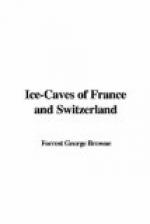Of course, we talked a little on Church questions; and they were astonished to hear that I was not only an ecclesiastic, but an ordained priest,—a sort of thing which they had fancied did not exist in the English Church. Rosset said the cures of small communes had about L40 a year, but I must have more than that, or I could not afford to travel so far from home. Had I already said the mass that morning? Had I my robes in the sac I had left at the Mairie? Was the red book they had seen in my hands (Baedeker’s Schweiz) a Breviary? They branched off to matters of doctrine, and discussed them warmly; but some things they so accommodatingly understated, and others they stated so fairly, that I was able to tell them they were excellent Anglicans.
Higher up in the forest, we were nearly overwhelmed by a party of charcoal-porters, who came down with their traineaux like a black avalanche. A traineau is nothing more than a wooden sledge, on two runners, which are turned up in front, to the height of a yard, to keep the cargo in its place. In the more level parts the porter is obliged to drag this, but on the steep zigzags its own weight is sufficient to send it down; and here the porter places himself in front, with his back leaning against the sacks of charcoal and the turned-up runners, and the whole mass descends headlong, the man’s legs going at a wild pace, and now one foot, now the other, steering a judicious course at the turns of the zigzags. The charcoal is made by Italians, who live on polenta and cheese high up in the mountains, and bring their manufacture down to a certain distance, after which the porters take it in charge. The men we saw told us that by hard work they could make four journeys in the day, earning a franc by each; out of which, as they said, they must support stomach and boots, one journey making them ready for a meal, and eight journeys finishing a pair of soles.
It cost us an hour and a half to reach the maire’s first chalet, where we were to lunch on such food as the old woman who managed it might have on hand; that is to say, possibly bread, and, beyond that, milk only, in some shape or other. The forms under which milk can be taught to appear are manifold. A young Swiss student, who in the madness of his passion for beetle-hunting had spent fifteen days in a small chalet at Anzeindaz, sleeping each night on the hay,[67] gave me, some time since, a list of the various foods on which he lived and grew fat. The following is the carte, as he arranged it:—




